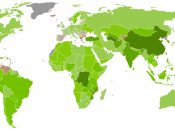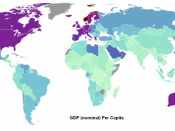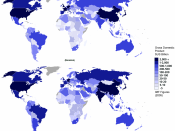Known for its strong work ethic, advanced technology, and a well grounded government-industry relationship, Japan has advanced with astonishing speed to hold rank as the third largest economy in the world after the United States (US) and China based on its purchasing power. When measured in terms of exchange rates, Japan is the second largest economy. One prominent characteristic of its economy is the cohesive work relationship of manufacturers, suppliers, and distributors in closely-knit groups called "keiretsu" (CIA). The guarantee of lifetime employment is another basic aspect of the Japanese labor force. Japan's industrial sector is heavily dependent on imported raw materials and fuels. The tiny agricultural sector is highly subsidized and protected, with crop yields among the highest in the world and maintains one of the world's largest fishing fleets.
One of Japan's top economic competitors is the United States, which has the largest and most technologically powerful economy in the world (CIA).
The US has a market-oriented economy in which individuals and businesses make most of the decisions, and the federal and state governments purchase needed goods and services mainly in the private marketplace. One notable difference between the US and Japan's economies is that US businesses have much greater flexibility in decisions to expand capital plant, to lay off surplus workers, and to develop new products. Concomitantly, they face higher barriers to entry in their competitors' markets than the barriers to entry of foreign firms in US markets.
The economy includes every aspect related to the production and consumption of goods and services in a particular region. It changes, expands, and fluctuates, sometimes growing slowly and even shrinks (Hall and Papell 3). Economics can be split into two categories, Macroeconomics and Microeconomics. Macroeconomics is the study of trends in the economy as a whole, while microeconomics concentrates...


